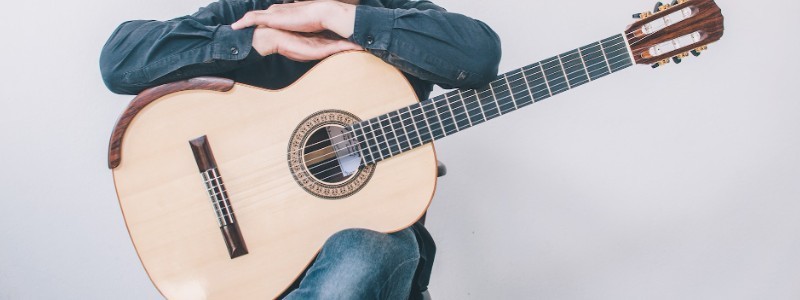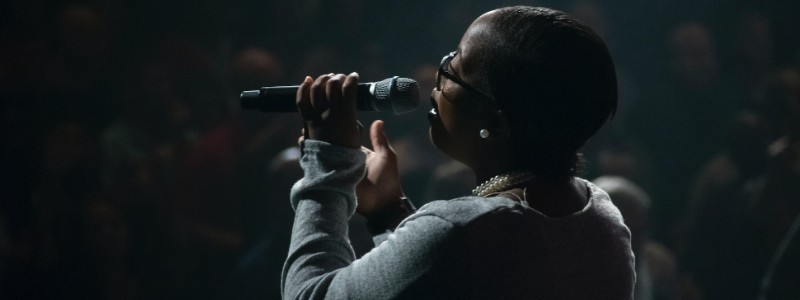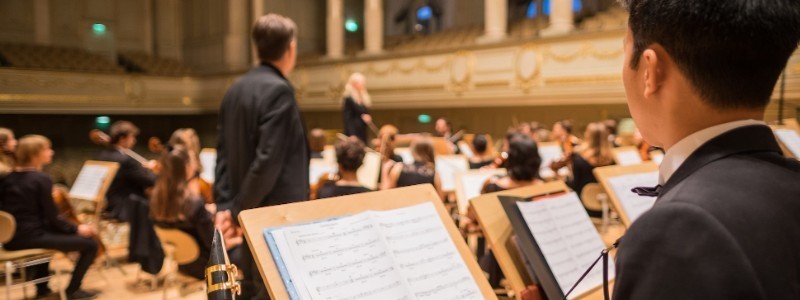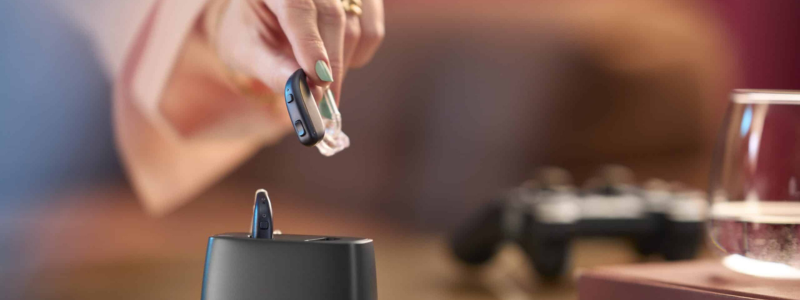
Head of Online Medical Content

Audiology Expert

Hearing Aids for Musicians
Exploring the technology that enables you to enjoy music again
Overview | The challenges | Processing music | Main features | MyMusic program | Conclusion | Chat to us
Last Hearing Aid UK Update:
Overview
This article looks at how hearing aids are being tailored for musicians, addressing the unique challenges music poses compared to speech.
Features like low-latency processing, custom frequency settings, and programs like Oticon’s MyMusic help preserve musical detail and quality.
With the right technology and audiologist support, musicians can continue to enjoy and perform music with confidence.
Hearing aids for musicians
Some hearing aids are designed to preserve the quality of music and sound for musicians. They offer features like wide dynamic range compression, low latency processing, and customisable sound profiles.
These aids ensure accurate sound reproduction, allowing musicians to hear subtle nuances and maintain their performance quality.
Some hearing aids are designed with musicians in mind
Some hearing aids include specific features designed to help musicians with hearing loss improve their ability to hear and perform music.
These hearing aids are often customised to meet the unique needs of musicians and may have features that are not found in standard hearing aids.
The challenges of hearing aids and music
Being able to understand, enjoy, and relate to music can sometimes be difficult for those with hearing loss. In the same breath, music perception has historically been one of the hardest challenges for hearing aids to try to overcome.
There are so many factors, dynamics, and complexities within music when compared to sound, which makes it difficult to personalise the experience for the wearer.
But what is the value of personalisation when it comes to experiencing music for those with hearing loss? How is music processed within hearing aid technology?
Why do those with hearing loss and hearing aids find music difficult to process?
The focus of hearing aids has, understandably, been to amplify speech and sound. Therefore, when trying to tackle the sound quality of music, hearing aids apply speech-processing strategies to music. But sound and music are not the same.
Music has a larger frequency and dynamic range than speech. There is no "one size fits all" approach to either, and this method means that a few of the nuances of music are lost.
There are two main problems that those with hearing loss experience when listening to music while wearing hearing aids. The first one is the natural problems as a result of hearing loss, and the second is the challenges due to the limitations of hearing aid technology.
Let me explain. Audibility problems are a result of hearing loss, such as pitch perception and the challenges of hearing and recognising instruments and hearing and understanding lyrics in music.
This, in turn, has a negative impact on enjoying both music and lyrics; therefore, putting into context the meanings of songs is often difficult.
Hearing aids can distort the music experience for musicians
Hearing aid technology can cause other issues, like feedback and distortion, when the wearer is listening to music while wearing hearing aids.
Even today's advancements in signal-processing strategies used for speech can have a negative impact on music appreciation. A good example of this would be the generic feedback manager that modern hearing aids have.
This feature does a really good job of reducing feedback in conversation, but can often suppress music as it can misidentify it as feedback. Imagine how hard this must be for musicians wearing hearing aids, as they rely heavily on recognising music nuances, cues, and instruments.
Such music perception problems get even harder the more severe the hearing loss is, as tones, harmonies, and melodies are tricky to distinguish.
Examples of common features within hearing aids that can support musicians include:
- Multiple microphones: These help to improve the clarity and directionality of sound and can make it easier for the wearer to hear and understand speech and music in noisy environments.
- Noise reduction technology: This helps to reduce background noise, making it easier for the wearer to focus on the sounds they want to hear.
- Telecoils: Telecoils allow the hearing aid to connect wirelessly to devices such as instruments, amplifiers, and sound systems, making it easier for the wearer to hear in these situations.
- Multiple program settings: These allow the wearer to customise the hearing aid for different environments, such as quiet settings, noisy settings, and settings with music.
- Customised frequency response: Some hearing aids for musicians are customised to boost specific frequencies that are important for hearing and performing music, such as the frequencies of musical instruments and vocals.
So, how is the audiology industry tackling this problem today? Are there any best hearing aids for musicians on the market?

Hearing Aids for Musicians and Singers
Oticon MyMusic hearing aid program
Exploring the technology that enables you to enjoy music again
In an ideal world, hearing aid technology would cater to those who wear hearing aids to enjoy music by amplifying it in such a way that it brings out all the details.
Even if the hearing loss is mild or severe, personalisation features will enable music to be experienced as it was created to be.
Allowing unique characteristics and nuances within music to be enhanced, recognised, and appreciated - and this is something Oticon has stated is possible with their MyMusic program. But how does it work?
Oticon's MyMusic program could open doors to music appreciation
The MyMusic program, first seen in the Intent hearing aid range, uses a whole new strategy for amplification. They have built this upon research to improve the music experience for hearing aid wearers, no matter what level of hearing loss they have. This is done by:
- Signal processing is used in both 4 and 24 channels at the same time to help maintain details, whichever signal type it is, i.e music.
- Using additional amplification in the highest and lowest frequencies allows better balance across all of them. Giving the wearer the ability to distinguish between soft and loud components in music.
- Ensuring the natural dynamics of music are preserved and maintained in both live and streamed music.
Related reading: Oticon hearing aids
Hearing loss for musicians
Hearing loss must be treated to prevent further damage to musicians. Singers' or musicians' ears are such a focus in their career, as untreated hearing loss can affect workability. Musicians rely on hearing to fine-tune a full spectrum of sound simultaneously.
This is so important because music compositions can include a variety of instruments and vocals running at the same time.
So, whether you are singing or playing an instrument, healthy hearing is essential. Unfortunately, in reality, musicians are at high risk of developing hearing loss and/or tinnitus.
This is simply due to being exposed to loud noise for long periods of time. Noise-induced hearing loss can often start as mild, but then gradually worsen to a more severe level over time.
Related reading: Noise induce hearing loss

Hearing Aid Technology for Musicians
Hearing solutions that can help musicians hear the way they need to
Hearing aids and technology designed for musicians
An audiologist will discuss the best hearing solution for your hearing loss needs, as there are hearing aids out there that include features and technology that will assist musicians to simply hear better and make life that little bit easier.
This could be speech enhancement technology that assists in a better understanding of lyrics or hearing aid accessories that can send music straight to both hearing aids. This means that the music or sound you need to hear clearly is delivered more safely.
Other technologies can separate and distinguish music from vocals or sound from speech. Because they are processed in different ways, it means that you can listen more clearly.
Key takeaways
- Musicians face unique challenges with hearing aids, as music has wider frequency and dynamic ranges than speech
- Standard hearing aids apply speech-processing strategies to music, causing loss of musical nuances and detail
- Common problems include feedback, distortion, pitch perception difficulties, and trouble recognising instruments
- Specialised features for musicians include multiple microphones, noise reduction, telecoils, customizable programs, and tailored frequency responses
- Oticon's MyMusic program uses 4 and 24-channel processing simultaneously to maintain musical detail and preserve natural dynamics
- Musicians are at high risk of noise-induced hearing loss due to prolonged exposure to loud sounds
- Modern hearing aid technology can separate music from vocals and deliver sound safely through streaming
- Low-latency processing and wide dynamic range compression help preserve musical quality
- With proper hearing aids and audiologist support, musicians can continue performing and enjoying music effectively
Conclusion
Musicians with hearing loss often struggle to enjoy or perform music due to the limitations of standard hearing aids, which are primarily designed for speech.
Specialised hearing aids—featuring wide dynamic range, low latency, and custom sound profiles—can better handle the complexity of music.
It also explores Oticon’s MyMusic program, which aims to enhance music clarity for all levels of hearing loss. With advances in hearing technology and personalised fittings, musicians can regain access to the full richness of sound.
I interviewed Professor Alinka Greasley about her research on improving the music experience for hearing aid wearers and asked her thoughts on Oticon's MyMusic program.
"Music programs have been developed, but they are at an early stage of development because there hasn’t been enough research. It isn’t a one-size-fits-all situation, so it all comes back to personalisation, and that’s the difficulty.
There is mixed evidence as to the benefits of music programs. There’s room for improvement and manufacturers are working on it, so rather than either or –, it’s just about developing a greater understanding of what is needed"
Why Choose Us?
- FREE Hearing Tests
- Best Hearing Aids and Prices
- FREE Aftercare for Life
- FREE Home Visits
- 200+ Local Audiologists
- 60 Day Money Back Guarantee
Are you a singer or musician and need more support with hearing aids?
If you're a musician or singer struggling with hearing loss, the right hearing aids can make all the difference between simply hearing sound and truly experiencing music again.
Features like Oticon's MyMusic program, low-latency processing, and customised frequency settings can help you hear every nuance, from subtle harmonies to complex instrument layers.
We can help you if you would like any more information on hearing aids for musicians, hearing healthcare or other hearing aid ranges - please call us free on 0800 567 7621 to speak with one of our audiologists.
Other hearing aid technology articles you might like...
 Parts of a hearing aid
Parts of a hearing aid  What hearing aid features do I actually need?
What hearing aid features do I actually need?  Speech enhancement in hearing aids
Speech enhancement in hearing aids Our specialist service includes:
Do not spend hundreds of pounds without getting a second opinion from us.
Please call us on 0800 567 7621
 Not only are the prices great, but the service is fantastic! Many thanks to your team.
Not only are the prices great, but the service is fantastic! Many thanks to your team.Watch the Oticon MyMusic video below
What's included in our hearing aid prices?
Other pages you might find useful
Common FAQs about hearing aids for musicians
Can you hear sound and play music with hearing aids?
If your hearing aids and phone supports Audio Streaming for Hearing Aids (ASHA), you are able to stream sound directly from your audio device to your hearing aids.
Can noise-induced hearing loss be corrected?
The short answer is no, but there are successful treatments to support better hearing - such as hearing aids. Listening to loud noise for a long period of time can cause hair cells in the ear to die. These can not grow back and damage to the inner ear and/or auditory neural system is permanent.
Ask the Experts
6 Morton Lane
Walkwood
Redditch
Worcestershire
B97 5QA
Latest Launch
When we refer to a product as 'Latest Launch', we mean it is the latest to be released on the market.
New
When we refer to a product as 'New', we mean that the product is the newest hearing aid model on the market.
When we refer to a product as 'Superseded', we mean that there is a newer range available which replaces and improves on this product.
Older Model
When we refer to a product as an 'Older Model', we mean that it is has been superseded by at least two more recent hearing aid ranges.
